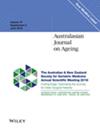Assessing the impact of ‘Age-Friendly Cities and Communities’ membership: Health and activity outcomes among older adults in urban Japan
Abstract
Objective
Population ageing and urbanisation are global trends that highlight the importance of cities as a nexus for policy and planning to support healthy ageing. This study assessed whether membership in the World Health Organization's Age-Friendly Cities and Communities (AFCC) Network is associated with improved health behaviours and outcomes among older adults in urban Japan.
Methods
Three geographically diverse Japanese AFCCs (Akita, Takarazuka and Fujisawa) and one non-AFCC (Musashino) were selected. Quota samples of 175 middle-aged and older adults were obtained in each city (n = 700). Validated Japanese-language instruments measured physical activity (IPAQ-SF), environmental perceptions (IPAQ-ENV), health-related quality of life (WHOQOL-BREF) and expectations regarding ageing (ERA-12).
Results
Over 60% of AFCC residents met physical activity guidelines, with walking as the dominant mode. However, AFCCs performed no better than the non-AFCC in terms of physical activity, health status or future health expectations. Akita, Japan's longest-standing AFCC member, recorded significantly lower scores across all health and activity indicators. Environmental features, including walkability and access to services, were not significantly associated with sufficient weekly physical activity. Only physical health status was a significant predictor of adequate activity.
Conclusions
Membership of an AFCC Network was not associated with better physical activity or health outcomes in urban Japan. Findings raise concerns about the implementation and impact of the AFCC framework, highlighting the need for more robust evaluation, greater national coordination and participatory planning. Policy reform may be necessary to ensure that symbolic commitments to age-friendly planning are translated into tangible health benefits for older urban populations.

 求助内容:
求助内容: 应助结果提醒方式:
应助结果提醒方式:


